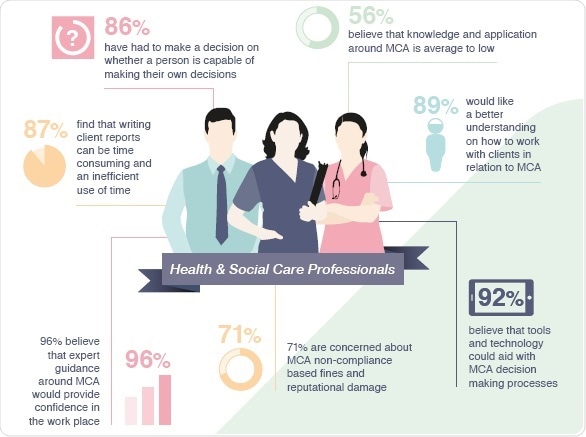Nov 8 2016
89% of professionals would like a better understanding of the Mental Capacity Act with 87% reporting the bureaucracy of manually writing reports is acting as a burden
A survey of health and social care professionals in England and Wales has discovered shortfalls in adhering to key legislation designed to protect vulnerable patients. Over half (56%) consider awareness and application levels of the Mental Capacity Act (MCA) 2005 to be low to average. An additional 89% state that they would like a better understanding of how to work with patients under the MCA. The survey follows a recent Care Quality Commission report, stating that despite pockets of good practice, hospital and care providers are still not adequately implementing their responsibilities around the MCA.

Research by Desuto demonstrates that health and social care professionals would like a better understanding on how to work with patients under the Mental Capacity Act
Desuto, a provider of online decision support and report writing tools for health and social care professionals, carried out the survey to establish industry attitudes and opinions on implementation of the Act. Respondents included various professionals such as social workers, nurses and care home managers that are required to comply with the MCA. The results evidence the need for more support as the stress of clinical demand, time pressures and lack of resources take their toll. Almost three quarters (71%) of respondents also express concerns over litigation and other non-compliance related consequences.
There is a clear desire for more support to aid with decisions and reporting as 96% of health and social care professionals agree that expert guidance and information around the MCA would provide more confidence in the workplace. Furthermore, 92% of respondents believe that tools and technology could aid with the decision-making process and streamline reporting. Efficiency was also found to be an issue with 87% of respondents finding the creation of patient reports time-consuming.
Mike Hostick, CEO of Desuto states:
Protecting the rights of patients is paramount to health and social care professionals. Our survey demonstrates, however, that to do so the industry needs more information on hand to help with decision-making. This is matched by an eagerness from professionals to meet their obligations as fully as possible – with the right education and support. A number of barriers are preventing professionals from feeling fully confident in practice which in turn could adversely affect patient care.
Mike Hostick continues:
There is an increasing acceptance of digital health tools in the NHS and care sector, which has been shaping the way in which professionals work. New tools and technology are sought in order to streamline processes and provide real-time information and resources. As this continues to evolve, we expect technology to play a greater role in the decision-making process and particularly with the successful adoption of the MCA. These tools will also help to alleviate concerns around the potential financial consequences and reputational damage of non-compliance.
Desuto provides a unique new online tool designed to transform the decision-making process for health and social care professionals across the UK in relation to the Mental Capacity Act. The tool supports making lawful and ethical decisions for those who are unable to make decisions for themselves. It generates detailed, professionally written reports to streamline the process and helps to increase user knowledge.